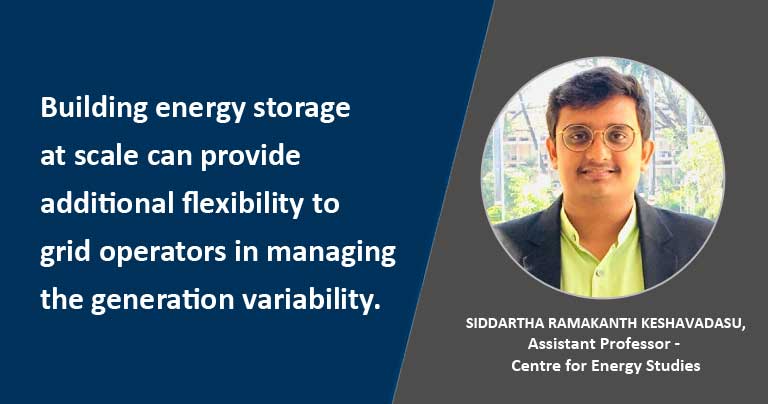Increasing flexibility with new age storage technologies
By EPR Magazine Editorial November 11, 2021 12:03 pm IST
By EPR Magazine Editorial November 11, 2021 12:03 pm IST

In an interview with EPR Magazine, Prof. Siddhart Ramakanth, Assistant Professor – Centre for Energy Studies, talks about Major elements impacting the deployment of energy storage solutions, smart grids and the shifts towards renewable energy.
How are the present market trends impacting the demand for energy storage systems in India?
Energy storage is one of the key enablers in India’s energy transition, it offers new business prospects in power sector. With newly added renewable energy to the grid and increasing aspirations to become more sustainable, both grid-scale and off-grid storage solutions are picking up demand. In addition to conventional electricity solutions, the energy storage for two and three wheelers are becoming a formidable force in the market.
With DISCOMs also planning for grid stability and resilience and planning for inclusion of EVCS as part of their grids, the demand for energy storage systems will increase further. The major elements impacting the deployment of energy storage solutions are deployment of smart grid, shifting focus towards renewable power, and commercialisation of innovative technologies.
With the increasing power demand, how do you view the call for energy storage for industrial, commercial and residential spaces?
Localised energy storage systems are not new to the commercial, industrial or residential sector; they have been in place for decades in the form of diesel storage mechanisms. However, traditionally adopted energy storage technologies are not designed to conserve energy, and losses associated with energy conversion are inevitable. However, with the new-age storage technologies provides flexibility to reduce electricity costs, become self-reliant, manage load in a building or to balance load and generation in the power grid. From the owner’s (Industrial/residential/ commercial) perspective, storage allows to optimise energy costs while maintaining comfort on risks associated with supply or grid failure. From a grid operations perspective, building storage at scale could provide additional flexibility to grid operators in managing the generation variability from intermittent renewable energy resources (wind and solar).What are the challenges being faced for energy storage?
Advanced energy storage provides an integrated solution to some of India’s most critical energy needs: electric grid modernisation, reliability, and resilience; sustainable mobility; flexibility for a diverse and secure, all-of-the-above electricity generation portfolio; and enhanced economic competitiveness for remote communities and targeted micro-grid solutions and last but not the least reducing the oil imports and become energy secured and shield itself for geo-political risks involving oil supply and prices.
However, there are few challenges in mass deployment of energy storage. Commercially speaking, on the Performance and Safety front, Grid operators must be confident that energy storage systems will perform as intended within the larger network. Advanced modeling and simulation tools can facilitate acceptance-particularly if they are compatible with DISCOMs/Transco communication framework. On a regulatory angle, Energy storage systems provide different functions to their owners and the grid at large, often leading to uncertainty as to the applicable regulations for a given project. Regulatory uncertainty poses an investment risk considering high up-front cost and dissuades adoption.
How do you view the demand for solar and Li-Ion batteries in the coming years?
As the share of RE grows, so will the drop in renewable power provided during peak times of demand. This drop will either have to be compensated by flexible and responsive power – as is the case with coal today (and hydropower to a certain extent) – or by massively improving ESS and making the grid more flexible. This is the opportunity for batteries.
We use cookies to personalize your experience. By continuing to visit this website you agree to our Terms & Conditions, Privacy Policy and Cookie Policy.